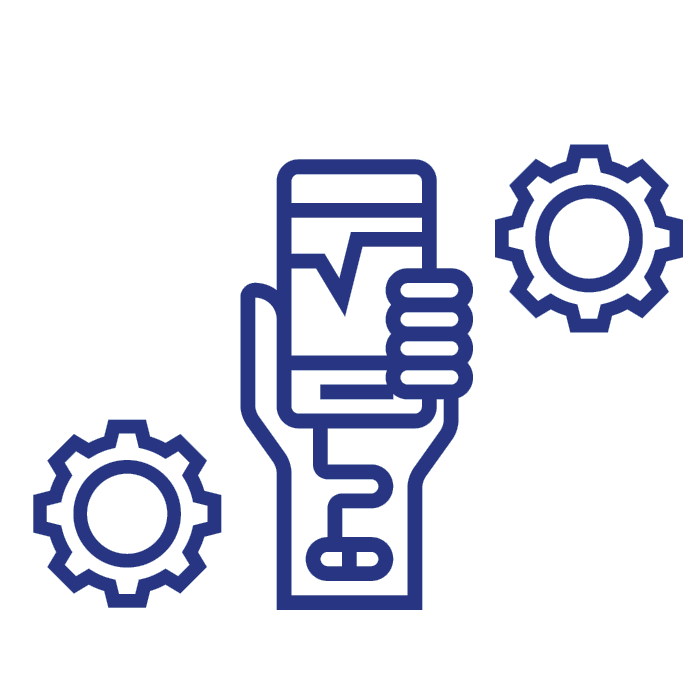Information Technology and Innovation
2018 was a year of consistent digital transformation across Aeroflot Group, covering both customer journeys and experience, and the Group’s entire operations, including management of the Company, aircraft maintenance, and information security.
Information technology
Digital transformation takes place in line with the IT Strategy adopted by PJSC Aeroflot’s Board of Directors on 29 August 2018 to contribute towards the Group’s strategic goal of increasing passenger traffic.
The Company closely liaises with the industry community. In 2018, preparations were made for PJSC Aeroflot to join the Digital Transportation and Logistics Association focused on driving digital transformation across the transportation industry, as well as on creating and developing a single multimodal digital transportation and logistics environment across Russia.
 Digital solutions for passengers
Digital solutions for passengers
Aeroflot introduced new payment options for air tickets and value-added services through advanced payment services such as Samsung Pay and Google Pay, as well as a bank-card recognition module.
The new Pass2U e-wallet functionality is a convenient way for passengers to store tickets, boarding passes and Aeroflot Bonus loyalty cards.
A number of new functions were added to the mobile
application enabling Aeroflot’s customers to purchase
health insurance, buy Aeroexpress tickets, rent
cars, order special meals from the À la Carte menu
on selected flights, pay for excess baggage as well
track their baggage.
Maps of 12 global airports were added, including an interactive plan of Moscow Sheremetyevo airport with the airport building navigation feature.
The functionality of Aeroflot airline’s contact centre
was considerably expanded to optimise the work
routine for operators and reduce response times,
including a new dedicated hotline for passengers
with disabilities and a dedicated information service
to advise passengers on their baggage status
and handle customer calls. Certain improvements
were made to flight booking via Aeroflot’s pay-byphone
service. 1,300 operators serve passengers
during the high season. About 9 million calls were
handled during the year, including in six foreign
languages.
The first phase of the Two-Factor
Authentication project was implemented
to improve security of Aeroflot Bonus
programme accounts. To log in, users need
to enter a confirmation code received via
the SMS-Info service.
Aeroflot has been actively developing its
programme to sell value-added services
to customers. Aeroflot introduced class
upgrades and advance seat selection
for travellers on low fares. Aeroflot also
launched a new service allowing passengers
to book airport transfers within the city
of arrival and a new À la Carte Menu paid
service.
Aeroflot launched a Wi-Fi-based service providing
passengers with an access to free entertainment
content via personal mobile devices on board
twenty-six of its A320 aircraft.
Self baggage check-in desks based on a unique
solution of Russian design were installed at Terminals
D and B at Sheremetyevo airport as part of its joint
project with Aeroflot.
Aeroflot’s online services became even more
accessible, including for people with disabilities.
The Company added a voice-enabled ticket search
feature to its mobile application and introduced
the Shoulder Belt service for passengers to order
an extra holding device for the flight.
 PJSC Aeroflot’s key
IT projects in 2018
PJSC Aeroflot’s key
IT projects in 2018
Aeroflot continues to develop its project for building
an integrated airline retailing environment to the NDC
standard. The NDC standard allows for high
personalisation with a focus on each passenger’s
preferences, enabling passengers to make better
informed decisions when planning a trip.
Aeroflot places a particular emphasis
on the use of Big Data in its IT
initiatives. The proprietary solution used
by the Company enables processing
big data to boost sales and improve
passenger loyalty. As part of its Big
Data initiatives, Aeroflot has already
implemented a predictive system that
recommends potential destinations
for customers, a tool to forecast revenue
expected from a given segment,
and AI-enabled review of customer
inquiries and complaints.
Aeroflot’s Tax Monitoring Data Mart project introduced
Company-wide tax monitoring, a new form of supervision
for major taxpayers.
Aeroflot implemented the requirements of the Federal Tax
Service to issue receipts for online cash settlements via
PJSC Aeroflot’s web services on the Company’s payment
page to comply with Federal Law No. 54-FZ.
The Company’s information resources have been aligned with the requirements of the General Data Protection Regulation (GDPR).
Pursuant to Federal Law No. 376-FZ, Aeroflot airline
adopted a passenger blacklisting practice to automatically
alert the airline’s employees to bookings made
by blacklisted passengers to prevent them from paying
for air tickets online.
The Company’s specialists took part in setting up the IT
infrastructure at the new Terminal B of Sheremetyevo
airport.
Before and during the 2018 Football World Cup, Aeroflot ensured highly reliable operation of its check-in, operational, and communications systems.
IT upgrades across subsidiaries
The large-scale digitisation of business processes across all Aeroflot Group companies is essential to the Aeroflot Group Development Strategy. A more robust and transparent operating model can be built across the Group through optimising operations of its subsidiaries and new technology adoption.
In 2018, Rossiya airline successfully deployed and upgraded a number of key IT systems. In particular, the airline adopted an automated IT system to manage IT solutions and customer service systems, as well as Microsoft Dynamics, a cutting-edge talent management solution. The airline also improved its sales of value-added services on charter flights via its new online platform.
Aurora airline implemented a number of major IT projects to upgrade its management system and deliver seamless and user-friendly customer experience across the airline. Passengers can now connect their own devices to the new Aurora Entertainment system to access content available on their flight. The airline also rolled out a new revenue management solution and an automated IT system for sales offices. The airline’s website structure and functionality were upgraded to offer passengers value-added services, with Mir cards now also accepted for payment.
Pobeda airline rolled out Jeppesen’s Crew Pairing digital solution to optimise airline crew scheduling, productivity, safety and operational stability.
Innovative development
Aeroflot Group makes consistent efforts to develop and implement innovative solutions across all areas of its activities. To further sharpen its competitive edge, the Group is building an innovation ecosystem, incorporating innovative solutions into both operations, and organisational and administrative processes.
In 2018, we continued implementing Aeroflot Group’s Innovative Development Programme 2025 which covers the main innovation focus areas and activities at Aeroflot Group, including Aeroflot airline and its Rossiya and Aurora subsidiaries.
The Innovative Development Programme was fully aligned with the action plans (roadmaps) for developing industries and the regulatory guidelines of federal executive authorities, and adopted by PJSC Aeroflot’s Board of Directors on 25 August 2016 (Minutes No. 1).
ITS KEY FOCUS AREAS INCLUDE:
- improving flight safety and building an integrated security and anti-terrorist system
- enhancing Aeroflot’s competitive position, including such key metrics as the share of the air transportation market and customer satisfaction with the services we provide
- automating operating and administrative processes of Aeroflot airline
- replacing outdated and inefficient technology with advanced solutions, including Russia-developed technology
- improving environmental performance, energy efficiency, and resource conservation
- increasing labour productivity and creating highly productive jobs.
KPIs under the Innovative Development Programme reflect the long-term vision for the Russian and international air transportation market and the goals of the Long-Term Development Programme, Strategy, and investment programme. The Innovative Development Programme’s KPIs include reduced product costs, higher quality of services, energy savings, lower environmental footprint, and increased labour productivity.

Aeroflot’s History
In 1969, the first in-flight TV services using video systems based on Yunost TV sets were offered to passengers on board Tu-134 aircraft.
Key innovative projects in 2018
The construction of Hangar 4
at Sheremetyevo airport to provide
aircraft maintenance and repair
services was continued in 2018 to drive
operational efficiencies through reduced
aircraft maintenance downtime.
The hangar will provide maintenance
services for Boeing 777-300ER aircraft
that can’t fit into PJSC Aeroflot’s existing
hangars. The project will create new jobs
and help reduce aircraft maintenance
and engine change downtime, as well
as reduce outsourcing by expanding
the range of in-house maintenance
services for Aeroflot’s aircraft. Hangar
4 is a unique facility which was granted
a useful model patent for an Aircraft
Maintenance Hangar.
The methodology for evaluating different components
of Aeroflot’s website design will help examine
the functionality of website design elements and modify
them including based on feedback from potential
customers. The new solution will help improve customer
satisfaction from the online ticketing journey and valueadded
service purchasing journeys.
Aeroflot has been developing a software solution
for transmitting RRJ 95B take-off and landing
data and flight assignments to Electronic
Flight Bags (EFB). Plans are to switch its
flight and engineering personnel to take-off
and landing modules for RRJ-95B aircraft
and EFB-based updatable flight assignment
modules. The project is scheduled for completion
in 2019.
The project provides for developing a set of criteria
to identify degradation in manual aircraft control skills
of pilots based on flight information, as well as identifying
and analysing flight deviations in the database.
A plan for the development of special software to track
degradation in manual aircraft control skills of pilots
for subsequent provision of individually tailored flight
simulator training was prepared as part of the project.
The Company reviewed national and international climate change
regulations, their focus areas, and associated risks to predict
potential impact on its operations. The proposed adjustments
to the Company’s strategy resulting from the review will help Aeroflot
comply with national and international climate change regulations,
including through improving its Carbon Disclosure Project (CDP)
score. To that end, PJSC Aeroflot is building a corporate greenhouse
gas (GHG) emissions management system with a focus on monitoring
direct and indirect GHG emissions and GHG reporting under ISO
14064. The project will also result in a set of targets for the reduction
of the Company’s climate footprint.
Aeroflot studies risk factors in passenger air transport
in order to enhance its corporate risk management
and strategic planning. The identified risk factors are used
to update Aeroflot Group’s Risk Register, the list of risks
related to the Long-Term Development Programme,
and key risks related to the refreshed strategy.
Aeroflot has analysed international best practice for innovation
in civil aviation. Analysing innovative development of global
innovation leaders and benchmarking Aeroflot Group against leading
international peers on technological, product, and organisational
innovations to identify promising solutions and adapt existing
technology and organisational innovations to Aeroflot’s needs.

Aeroflot’s History
In 2003, Aeroflot switched to an automated booking system by Sabre.
In 2007, Aeroflot introduced e-tickets for domestic flights and for its international agent network using global distribution systems.
As part of activities to build an innovative ecosystem, Aeroflot continued enhancing its one-stop-shop system implemented in 2017 to manage innovations proposed by small and medium-sized enterprises (SMEs). The system automates submission, processing, and decision-making processes for innovative proposals.
It has already helped process 46 proposals from SMEs and other innovation partners, including 30 proposals in 2018. The Committee for Innovative Development of PJSC Aeroflot’s Management Board comprises one-stop-shop experts, including from Rossiya and Aurora subsidiary airlines.
